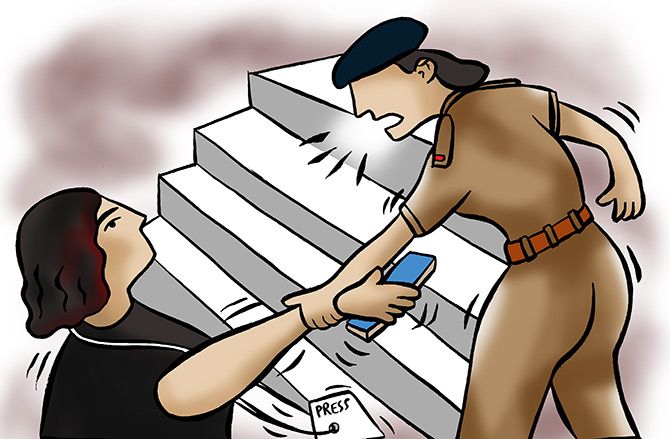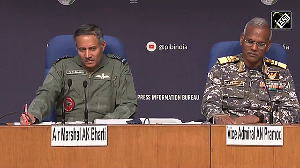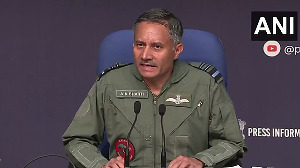Rediff.com Reporter Anita Aikara spotted a Mumbai constable violating the rules on Sunday, February 4.
When, like a good citizen, she objected, she was abused and manhandled by the constable.
Her PAN card was taken away and she was then charged with a false crime.
This is what Anita experienced -- all for being right.
Illustration: Uttam Ghosh/Rediff.com

Over the last five days I have gone through a lifetime of stress.
I have forgotten the number of times I skipped meals. It is surprising, but I don't feel hungry anymore.
Earlier every time I saw a cop, I felt a sense of warmth and protection. Now when I see one, a chill runs down my spine.
I have made a list of people who my husband needs to call in case I suddenly get arrested.
I am Anita Aikara, the journalist who reported the misdeeds of a constable who was encouraging ticketless travel and ended up booked under Sections 145B and 146 of the Railway Act (See box).
145B: If any person in any railway carriage or upon any part of a railway:
(a) is in a state of intoxication; or
(b) commits any nuisance or act of indecency or uses abusive or obscene language; or
(c) wilfully or without excuse interferes with any amenity provided by the railway administration so as to affect the comfortable travel of any passenger.
146: Obstructing a railway servant in his duties.
Sounds strange, doesn't it?
I was only doing my job as a responsible citizen.
I ended up appearing like a criminal.
Something I doubt I will ever fully digest.
I have always believed -- and would want to continue to believe -- that law enforcement representatives are meant to protect citizens. Not take the law in their own hands.
But the ordeal I went through Sunday February 4 has robbed me of that belief.
I was travelling, in Mumbai, in the first class compartment of a Virar fast, heading home, late afternoon, by local train, from a reporting assignment.
Mention 'Virar' and it will raise eyebrows in Mumbai.
It is no cakewalk getting into one of these trains that travel to north Mumbai.
Even on weekends they are extremely crowded. Passengers with valid first class tickets end up standing all the way. There are never vacant seats.
That day I got lucky. Seated with us was a woman home guard in uniform.
At Bandra, a group of women boarded the first class compartment.
They claimed to have second class tickets. Much to the disbelief of the passengers, the home guard encouraged them to come inside and sit.
At Andheri, north west Mumbai, these women decided to get off and change compartments.
The minute they stepped onto the platform, the home guard got off the train and in a split second was back in first class with them in tow.
The disbelief of the women passengers quickly turned to anger.
Soon women started heatedly questioning the off-duty home guard. They reminded her that despite owning first class passes they still ended up standing all the way home usually.
I began to document this chaos and commotion.
Fellow passengers saw my press card badge hanging about my neck. They asked me to ask the home guard why she encouraged ticketless rail travel.
When I got off at Borivali, she did too.
I walked up to her and tried to talk to her. That didn't go down well with her.
The constable came charging towards me and tried to grab my phone. I refused to let go of it.
I ended up being dragged all the way from the first class woman's train compartment to the Borivali station's RPF thana or police station (in northwestern Mumbai).
Scared of falling and hurting myself, I held on to her hand, while trying to ensure she didn't drop my phone.
She kept threatening me with dire consequences and said she would teach me a lesson, while I struggled to keep up with her pace.
The constable made me rush down a flight of steps. I prayed I wouldn't fall.
Then, she dragged me up two floors. I almost lost my breath.
Huffing and panting, I was brought to a room filled with surprised-looking RPF staff.
I tried to pry away her fingers that were clasping my phone. But in vain.
I was then dragged to her senior's office.
At this point, I was certain my ordeal would end.
I expected the senior officer to hear me out.
Within minutes I was proved wrong.
The woman home guard kept yelling and abusing me.
A huge crowd of officers from the Borivali RPF thana gathered.
I pleaded with them to hear my side of the story. They would not.
They started yelling at me.
I was petrified.
The woman home guard kept up her stream of abuse, trying to damage my phone. While a sub-inspector just stood there watching.
I seriously wondered if I would come out safe from this thana.
I had to call my husband urgently, in case anything happened to me
I told them I had to call him.
They asked me to use a landline.
I said I didn't remember my husband's number and was quickly judged for that.
They wanted to know what kind of woman I was who couldn't remember her husband's phone number.
The RPF personnel at this thana began to file a chargesheet against me under some provision of the railway law (145B and 146).
Another constable came across and started talking politely.
The woman home guard quickly jumped up out of her seat and started yelling at the constable. Her abuse of me continued.
When she was asked by her seniors to be quiet she got even more angry, slammed a chair and banged the desk.
Under her breath, she cursed me again, using filthy language.
Net result: If I don't show up at a court hearing, a warrant could be issued against me.
Anyone who has an idea of the law will know that usually an NC (non-cognisable offence) or FIR (first information report) is filed against the person.
In a bid to perhaps harass me further they directly filed this chargesheet.
They demanded my original PAN card, which I am told is unlawful, forced me to sign on the back of the said chargesheet.
Later I was told signing on the back of the chargesheet meant I was accepting I was guilty.
Throughout I was subtly told by these cops that if I went to court and pleaded guilty, then I could pay a fine and leave.
Pursuing the matter only meant unnecessary trouble.
One of the lady constables also told my husband that action will be taken against the home guard, who they said was known to have a bad temper, and she would end up losing her job. But I had to plead guilty in court.
On Monday, February 5, I was called to the Andheri metropolitan magistrate court in Andheri east, at noon.
I was there at 11. I waited till 1 pm, only to be informed that the Borivali RPF unit had forgotten to bring my papers to court.
When I was about to leave, a constable from the unit told my lawyer to ask me to wait.
The hearing was then pushed till 3. But at around 2.30 pm I was told to appear in court the next day.
The next day when my husband walked with me into court, he wasn't sure if I would return home with him.
Somebody told him that his wife might be taken into custody and a bail application had to be kept ready.
We didn't take the advice seriously.
Later, we realised we should have paid greater heed to the advice.
I had to quickly submit a bail application.
I'm out on bail and the next court hearing is in June.
My bail ends in two months and by then I will need to get a surety bond made.
I feel my freedom has been compromised.
Just because I chose to highlight something going wrong in our system.
The simplest thing would have been for me to go before the magistrate and plead guilty for an action I never committed, pay a fine and return to my daily routine.
That would have been the easy way out.
But not the right way.
I am blessed to have a supportive family. They firmly instructed me: Come what may you should not plead guilty for a crime that you have not committed.
My family promised they will get me out of this mess. I take their word for it.
My office didn't blink an eye before lending me their support.
What if I was not fortunate enough to have that supportive family? Or a supportive company?
Or the resources to fight a false charge?
Would my side of the story ever come out?
Would I have had to say "Kabool hain (I agree)" and then carry the guilt of taking the blame for something I didn't do throughout my life?
So here I am, on bail, for reporting the misbehaviour of an off-duty home guard in uniform encouraging ticketless travelling.
My mother-in-law told me to avoid going by train for a few days. Her fear is justified.
Another worried aunt asked me, "Tomorrow if the cop spots you at the station and decides to attack you in vengeance, will they slap a criminal case against you and lock you in custody?"
After what I faced in recent days, all I can tell her is, "Who knows!?"
I pray that one day justice will be served.
The right to share their side of the story should be given to every citizen of India, regardless of who they are complaining against.
I hope through my fight I can make a difference to society.
Afterword: I was able to retrieve my PAN card on Wednesday with special help from a lawyer.






